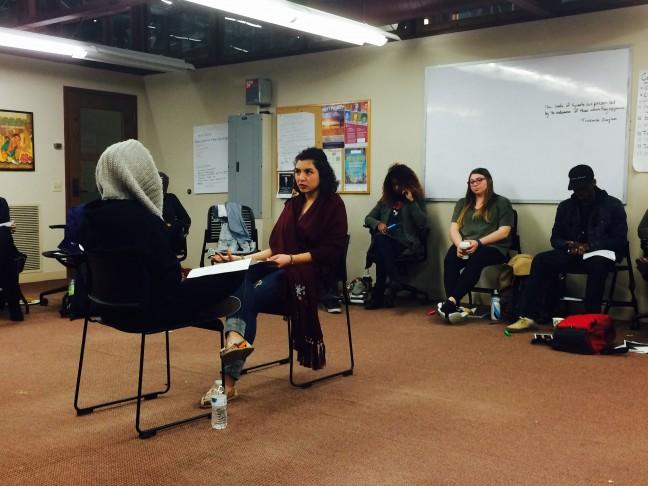Lively conversation and discussion took place in the Multicultural Student Center Thursday about how it’s important for minority students’ voices to be heard and valued at University of Wisconsin as student activists shared their personal experiences.
The workshop,“Interrupting Racism: Organizing for Racial Justice,” was different from traditional panel discussions because it had attendees form a circle around the speakers in the middle. Aside from encouraging conversation, this format has a deeper meaning, Laura Klunder, social justice education specialist at MSC, said.
“In a social justice framework, we ask questions about how do we center and uplift the voices of students of color,” Klunder said. “[With] this format, we actually centered the voices of students of color physically, and we as a community were invited to listen and hear their voices.”
While in the center of the circle, Jessica Franco-Morales and Mariam Coker discussed their racial identity and their experiences on the UW campus. Franco-Morales is a representative on the Associated Students of Madison who talked about how as a student and woman of color, she usually finds herself in places where people don’t value her opinions.
One of her favorite things about being a student leader and an activist, Franco-Morales said, is to challenge spaces with dominating racial prejudices and interrupt those opinions.
“I’m very deliberate and I try to make people uncomfortable, because I think it’s when people feel uncomfortable where you can tell learning takes place,” she said. “Only through being uncomfortable I think will people really have the chance to learn it and to get it.”
Franco-Morales and Coker also criticized UW administrators, such as Chancellor Rebecca Blank and Dean of Students Lori Berquam, for not acting as role models for the UW community.
When people running this institution are not responding proactively and making actions to address racial problems, it’s hard to expect students who come here to be culturally competent and inclusive, Coker said.
“Chancellor Blank, she always says multiculturalism helps with getting on in the real world,” she said. “Yeah, you say that, and you read that from a paper, but how much are you really dedicated to it?”
Kenneth Cole, UW’s Black Out march organizer, also participated in the conversation. He said racism is not the only type of injustice people in the UW community need to be concerned about.
As a sociology major, Cole said, the more he learned about social issues in class, the more he became convinced to help minorities’ voices be heard.
“I’ve been trying to find some type of way to use whatever I can, whatever is being given to me, whatever gifts I may have to affect those [social] issues, and I feel the best way for me [to act] is through advocacy,” Cole said.
Hazel Symonette, program development and assessment specialist in the Division of Student Life said students need to commit to outcomes of progressive movements, but not get too attached to the outcomes they have no control over. Reducing racism has a long way to go, she said.
“This is a marathon and not a sprint,” Symonette said.


